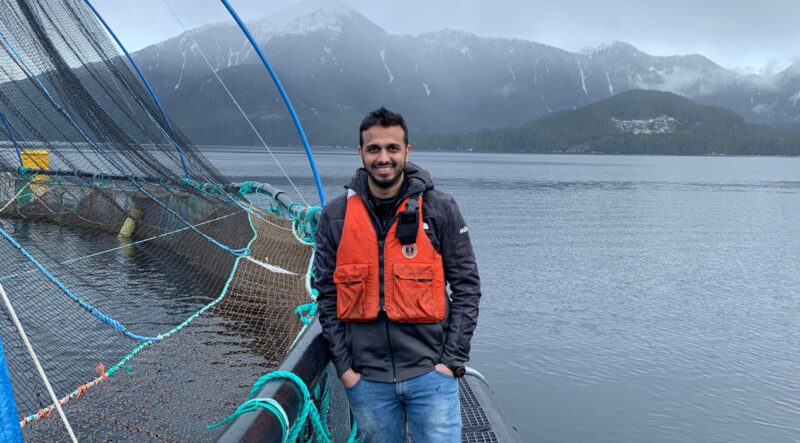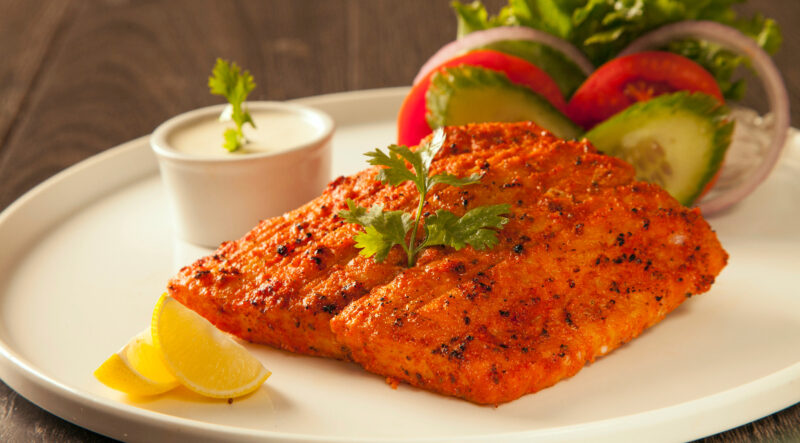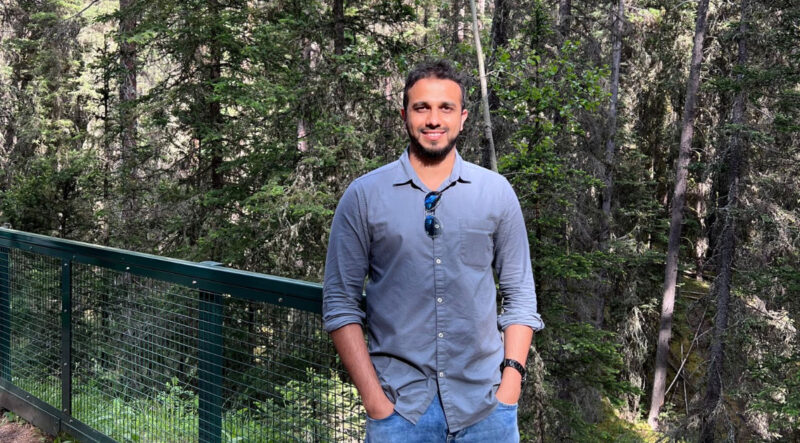THIS IS SALMON FARMING with MOHAMMED SHOAIB AHMED
“I’m really proud of our salmon farming practices because they have the lowest carbon footprint among all protein production methods, with emissions reduced by an impressive 70% compared to other sources…”
By: Samantha Bacchus McLeod
SeaWestNews
Aquaculture is responsible for thousands of high-paid, skilled, and rewarding jobs across British Columbia. As the demand for sustainable and affordable farmed salmon grows worldwide, there is a fit for virtually any career path in this industry. In the third of our Q&A series with young professionals in BC’s salmon farming sector, Mohammed Shoaib Ahmed, Supply Chain Manager at Mowi Canada West, chats with us about his life in the industry.
Tell us a bit about yourself.
I am originally from India, and currently residing in Campbell River, BC. I made the move to Canada in 2018 to pursue my MBA, and since 2019, I have been actively involved in the salmon farming industry, having worked with all the 3 companies, Mowi, Grieg, and Cermaq. Apart from my professional endeavors, I have a diverse range of hobbies. I find joy in boxing, which helps me stay fit and focused. Additionally, I like going on long drives to explore new places and enjoy the beauty of nature. Lastly, I also spend time to do religious studies, as it brings me a sense of peace and spiritual fulfillment.
Are there any challenges you face as a young salmon farmer in British Columbia?
One challenge is the limited awareness among the public regarding the scientific advancements in salmon farming. Many people still hold outdated views and believe that the industry hasn’t progressed in the past few decades. Educating the public about the modern practices and technological innovations in salmon farming is crucial.
Another challenge is the uncertainty surrounding the future of the industry due to a perceived lack of support from the government. Clear and supportive policies are needed to ensure the long-term sustainability of salmon farming. When there is uncertainty, it hinders investment and growth in the industry.
What are the specific misconceptions or misunderstandings people may have about salmon farming, and how do you educate the public about it?
The belief that salmon farms are responsible for the decline in wild salmon populations is a prevalent misconception. In reality, scientific research and studies have shown that the decline in wild salmon populations is caused by a combination of factors, including habitat loss, climate change, and natural predation. Salmon farming, when carried out responsibly, can actually help alleviate pressure on wild fish stocks by providing a sustainable alternative to wild-caught salmon. To educate the public about this, we actively promote transparency in our practices and share verified data from credible sources to showcase the true causes of declining wild salmon populations.
There is a prevailing notion that international salmon farming companies are indifferent to local environments and communities. However, this couldn’t be further from the truth. While these companies may operate on an international scale, they are deeply rooted in local communities. Over 90% of our workforce comprises locals, and we take pride in supporting the local economy and businesses. Through partnerships and collaborations, we actively contribute to the social and economic development of the regions we operate in, fostering a symbiotic relationship with the local communities.
How do you feel about the industry’s salmon farming practices, and its environmental responsibility?
I’m really proud of our salmon farming practices because they have the lowest carbon footprint among all protein production methods, with emissions reduced by an impressive 70% compared to other sources. This significant reduction in greenhouse gas emissions demonstrates our commitment to sustainability and environmental responsibility, making our farmed salmon an eco-friendly choice for conscientious consumers like us.
Opting for farmed salmon instead of wild-caught alternatives has a remarkable impact on the conservation of wild species, allowing them to thrive and regenerate. With around 90% of salmon consumption being supplied through farming, our responsible choice significantly reduces pressure on wild fish populations, giving them a chance to recover and maintain their delicate balance within marine ecosystems. It’s gratifying to know that our decision to support farmed salmon contributes to the preservation of our precious marine biodiversity.
How do you balance the economic aspects of salmon farming with the need for environmental stewardship and conservation?
Balancing the economic aspects of salmon farming with environmental stewardship involves adopting sustainable practices, adhering to strict regulations, engaging with local communities, and investing in research and education. By promoting transparency, traceability, and adaptive management, the industry can ensure economic viability while minimizing its impact on the environment and safeguarding the health of marine ecosystems.
What kind of technological advancements or innovations have you seen in salmon farming since you have been in the industry, and how have they influenced your work?
Improved net technology: This advancement has resulted in more secure nets that significantly reduce the risk of fish escapes and interactions with wild populations. These modern nets help maintain the integrity of the farming system while preserving the natural balance of marine ecosystems.
AI-powered fish feeding: The integration of Artificial Intelligence in feeding systems has led to more accurate monitoring of fish behavior and appetite. This allows for better feeding schedules, minimizing feed wastage and optimizing the health and growth of farmed salmon. As a result, it contributes to both economic efficiency and environmental sustainability in salmon farming practices.
Tell us about a couple of opportunities that is beneficial for a young salmon farmer in British Columbia?
Industry Growth: The salmon farming industry in BC has significant potential for expansion. This growth offers supply chain managers like myself a chance to play a crucial role in supporting the industry’s development. By implementing efficient supply chain strategies, optimizing logistics, and building strong partnerships, we can contribute to the industry’s growth and ensure a smooth flow of salmon products to meet the increasing demand.
Personal Growth and Learning: As the industry in BC continues to expand and reach its true potential, there are vast possibilities for individuals in various roles, including supply chain management. This growth allows for my continuous learning, professional development, and acquiring valuable industry knowledge and skills.

Can you share any other notable success stories or achievements in your salmon farming career so far?
Since joining the salmon farming industry in 2019 as a production intern with Grieg Seafood, my career has flourished, leading me to work in the procurement departments of Cermaq Canada and Mowi Canada West. Along this path, I have made meaningful connections with some of the industry’s brightest minds, collaborating with them to drive innovation and sustainability. Through these partnerships, I’ve expanded my network of suppliers globally and locally, all dedicated to the greater purpose of responsible aquaculture. As the Supply Chain Manager at Mowi Canada West, I take great pride in implementing cost-efficient measures and sourcing sustainable alternatives, knowing that together we contribute to the growth of the industry and the protection of our environment.
And finally, do you frequent a favourite restaurant for salmon sushi? Or, do you have a favourite salmon recipe you would like to share with us?
While I am not a fan of salmon sushi, I do have a go-to recipe for a delicious and flavourful salmon dish called Fish Tikka. This Indian-inspired dish combines marinated salmon with a blend of spices.
Salmon Tikka

Ingredients:
500 grams of fresh salmon fillets
2 tablespoons of yogurt
1 tablespoon of lemon juice
1 tablespoon of ginger-garlic paste
1 teaspoon of red chili powder
1 teaspoon of turmeric powder
1 teaspoon of cumin powder
1 teaspoon of coriander powder
Salt to taste
Vegetable oil for frying or baking
Instructions:
- In a bowl, mix together yogurt, lemon juice, ginger-garlic paste, red chili powder, turmeric powder, cumin powder, coriander powder, and salt to create a marinade.
- Cut the salmon fillets into bite-sized pieces and coat them with the marinade. Let the salmon marinate for at least 30 minutes to allow the flavors to infuse.
- For stovetop cooking, heat some oil in a pan and fry the marinated salmon pieces until they are cooked through and slightly browned. Alternatively, for oven baking, preheat the oven to 180°C (350°F), place the marinated salmon on a baking sheet, and bake for approximately 15-20 minutes until the salmon is cooked and nicely charred.

